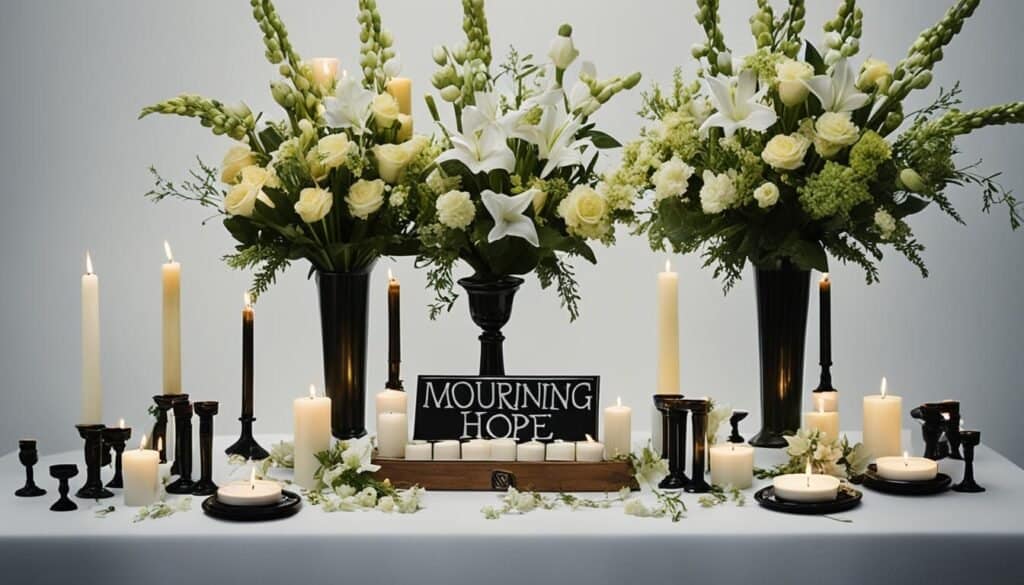This article looks into how Mourning with Hope can offer healing in grief, comfort, and a path forward for the grieving. How finding hope during sorrow changes our path, letting us journey through sadness? Let’s explore how hope changes everything and reveals the strong will found in every human heart.
Understanding Grief and Loss
To truly get what Mourning with Hope means, you have to know about grief and loss first. Grief is the mix of emotions we feel when we lose something important. This loss could be a death, the end of a relationship, or losing a job.
Grief changes for each person. There’s no one way to grieve correctly. It’s very personal and dependent on who you are and what you’ve lost. You might feel sad, angry, guilty, or confused. You could even feel relief, which is okay too.
Dying and death can change us physically, emotionally, and in our thoughts. You might be tired all the time, not want to eat, or find it hard to sleep. You might feel numb or have trouble paying attention.
Grieving isn’t a straight path. Emotions can go up and down. Special days or memories of the loss can make feelings intense. Grieving takes time, self-kindness, and the help of friends.
“Grief is like the ocean; it comes on waves ebbing and flowing. Sometimes the water is calm, and sometimes it is overwhelming. All we can do is learn to swim.” – Vicki Harrison
The Five Stages of Grief
Elisabeth Kubler-Ross came up with the five stages of grief. They can help folks understand their feelings. The stages are:
- Denial: A period of shock and disbelief, where individuals may struggle to accept the reality of the loss.
- Anger: Feelings of frustration, resentment, and injustice.
- Bargaining: A phase in which individuals may attempt to negotiate for a different outcome or make promises in exchange for a reversal of the loss.
- Depression: A deep sadness and longing that may accompany the acceptance of the loss.
- Acceptance: The stage in which individuals begin to find a sense of peace and begin to adapt to their new reality.
It’s key to note not everyone will go through these stages. Plus, how you grieve is unique to you.
The Importance of Acknowledging Grief
“The only way out is through.” – Robert Frost
Dealing with grief is hard but crucial for healing. It’s vital to face and respect our grief. Avoiding it can harm us long term.
Letting ourselves grieve helps us heal and learn. It’s during our saddest times that we might grow stronger and find new meaning in life.
In the next section, we’ll look at how hope helps during mourning. Let’s find out more about how hope brings comfort, strength, and healing. This is in our journey of Mourning with Hope.
The Importance of Hope in Mourning
Hope is like a beacon in the dark when we’re sad. It gives us comfort and strength when we’re down. In times of loss, hope helps us heal and find a purpose.
It comforts us, saying our pain won’t last forever. Even in the deepest sadness, it promises healing. Hope makes a lonely journey less so, reminding us we’re not alone in our pain.
“Hope is being able to see that there is light despite all of the darkness.” – Desmond Tutu
During mourning, hope is our strength. It helps us move through the hard parts of grief. Hope pushes us to seek support and rely on our loved ones. It shows us mourning is a path to healing, despite its challenges.
Yet, hope isn’t a magic cure for sorrow. It won’t make our pain disappear. But it does offer a bit of brightness, reminding us we can heal and find new purpose.
Cultivating Hope
Keeping hope alive takes work. We need to find things that inspire us, like self-care and connecting with others.
- Engaging in self-care activities that promote emotional well-being.
- Connecting with others who have experienced similar losses, either in person or through online communities.
- Finding solace in nature, art, music, or any form of expression that speaks to our souls.
- Exploring the deep spiritual and philosophical questions that arise during times of grief.
Actively working on hope helps us heal. It creates a place where hope can grow stronger.
A Table showing the Benefits of Hope in Mourning:
| Benefits of Hope | Explanation |
|---|---|
| Comfort and solace | Hope provides a sense of comfort and solace during difficult times, reminding us that healing is possible. |
| Strength and resilience | Hope empowers us to face our pain and build resilience, enabling us to navigate the ups and downs of the grief journey. |
| Renewed sense of purpose | Through hope, we can find a renewed sense of purpose and meaning in life, even in the face of loss. |
Hope can change how we feel during grief, giving us strength, comfort, and a new vision for life. By having hope, we remember our loved ones and find our way to healing and new joy. In mourning, hope guides us like a light.
Strategies for Cultivating Hope
Dealing with grief means working hard to find hope. We want to help you find brightness in tough times. By sharing helpful tips, we aim to give you the strength to recover with hope and joy.
1. Practice Self-Care
Taking care of yourself is key during grief. Prioritize your health to keep a strong mind. Do what makes you happy, like walking in nature, reading, or meditation. Focusing on you can refresh your mind and bring new hope.
2. Seek Support from Loved Ones
It’s vital to have family and friends who listen and support you. Talk about your feelings with those who love you. This makes you feel part of a caring group. Their advice can help you see a brighter future.
3. Find Meaning in Loss
Another way to find hope is by searching for meaning in your loss. Think about what your experience has shown you. You can also honor your lost loved one by doing things they loved or supporting their causes. This gives your journey purpose and hope.
“Hope is the thing with feathers that perches in the soul and sings the tune without the words and never stops at all.” – Emily Dickinson
Finding hope is a journey, and it’s okay to move at your own pace. Remember, every effort you make towards hope is a step forward. With each step, you find healing and purpose anew.
| Strategies for Cultivating Hope | Summary |
|---|---|
| Practice Self-Care | Prioritize your well-being and engage in activities that bring you joy and comfort. |
| Seek Support from Loved Ones | Surround yourself with a supportive network that provides comfort and empathy. |
| Find Meaning in Loss | Reflect on the lessons learned and infuse purpose into your grief journey. |

The strategies we’ve shared are signposts to help you heal and renew hope. By taking care of yourself, leaning on support, and finding meaning, you can slowly bring hope back into your life. Remember: hope is always growing and moving, leading you to a future full of light and new chances.
Finding Support in Community
Mourning with others who understand can be very helpful. In this section, we’ll see how community support can help us heal. We’ll look at support groups, therapy, and online forums and how they change our healing journey.
Grief can make us feel alone in our pain. Yet, connecting with others facing similar loss can comfort us. Sharing our stories helps us feel understood and belong.
“Finding support in community serves as a lifeline. It gives us solace, shows we’re not alone, and brings hope even at our lowest.”
Both online and offline, support groups provide a safe place for us to share. They offer empathy and understanding without judgment.
Therapy with professionals can guide us through mourning. It offers coping strategies and a supportive place to process our loss. We can explore our emotions and begin to heal in therapy.
Online sites have become key for reaching out to others who are grieving. They connect us worldwide, offering valuable resources and support. We can find help and understanding from others facing loss too.
By reaching out, we strengthen our healing through shared experiences. We get support from others and offer our help in return. Mourning together teaches us valuable lessons and new coping skills.
Support from others around us can be a lifeline in our healing. Being part of a caring community brings hope and comfort. Together, we grow stronger.
Support in Community: A Transformative Journey
When we mourn with others, we connect deeply with humanity. We find comfort knowing others understand our grief. This connection is powerful and helps us realize we’re not alone.
Through shared experiences, we find a place where compassion and friendship are found. Support in community gives us the courage to face each day and eventually find joy again.
| Benefits of Finding Support in Community | How to Access Support in Community |
|---|---|
| 1. Validation of emotions | 1. Join local support groups |
| 2. Sharing of experiences and coping strategies | 2. Seek professional therapy |
| 3. Emotional support and understanding | 3. Explore online grief forums and communities |
| 4. Sense of belonging and connection | 4. Engage in grief-related workshops or events |
| 5. Learning from different perspectives | 5. Connect with friends or family who have experienced loss |
Embracing Rituals and Traditions
Rituals and traditions are key in mourning, giving us both structure and meaning. They help us honor and remember our loved ones. Even in tough times, they offer comfort and support.
Our special mourning rituals are close to our hearts. They guide us through the deep emotions that come with grief. Things like lighting candles, visiting graves, or going to services, are very meaningful. They help us feel close to those who have passed.
In the words of Maya Angelou, “We find solace in knowing that our loved ones can still be a part of our lives through the rituals and traditions we create to honor them.”
Cultural mourning traditions differ greatly around the world. They show each society’s unique beliefs and values. Celebrations like Mexico’s Day of the Dead and Japan’s remembrance rites reflect this. Learning about these practices can broaden our view on grief. They also inspire us to create our own special rituals.
The Significance of Personalized Rituals
Custom rituals let us mourn in a way that meets our needs and values. They can be simple or detailed, showing who our loved ones were. Acts like creating a garden or making their favorite dish keep their memory alive.
Music is also crucial in rituals, bringing up strong emotions. Songs or melodies we shared with our loved ones can comfort us. They remind us of those we miss.
Creating Your Own Mourning Rituals
Creating meaningful rituals involves looking at our personal beliefs and ties with our loved ones. Here are some ideas to make your own rituals:
- Memory Collages: Make a collage or memory box with photos and letters about your loved one’s life.
- Candle Lighting: Light a candle to remember them on special dates or whenever you miss them.
- Writing: Write letters or poems to express your feelings and keep a connection. This can help you heal.
- Acts of Service: Do good deeds in their name, volunteer, or support causes they cared about.
- Remembrance Rituals: Plan a yearly gathering to share stories and celebrate their life with others.
There is no one way to make mourning rituals. The key is to make them meaningful. This process can bring comfort, hope, and connection as we cope with our loss.

Navigating Hope and Faith
For many, faith and spirituality are crucial. They offer comfort during grief, giving us strength and purpose. Here, we look at how hope, faith, and mourning work together to heal.
Grief is unique for everyone. Some find comfort in faith while others look elsewhere. But, knowing how hope and faith connect with grief helps us deal with loss.
Finding Hope in Spiritual Beliefs
Our faith helps when we’re sad. It shows us life has a deeper meaning and our loved ones are still with us. This belief in something after life lessens our grief.
Hope is powerful. It helps us see meaning even through sorrow. Praying, doing rituals, or meditating connects us with what’s beyond. This can bring peace in grief.
Embracing Community and Support
Faith communities give much comfort. When people with the same beliefs gather, it feels like home. They offer support, friendship, and a way to mourn together.
There are also support groups and organizations. They help people from various beliefs find solace. Here, sharing stories and listening brings comfort and understanding.
Finding Strength and Resilience
In sadness, our faith can make us strong. The practices that have helped before, help us again. They inspire and heal us.
Faith is hopeful. It shows us a bigger picture, even in sorrow. It teaches us we are not alone. There’s always a power guiding us, offering help and light.

Moving Forward with Hope
Mourning with Hope is a journey that goes beyond finding comfort now. It’s about moving forward with new purpose and meaning. We will discuss ways to heal and find joy during this part of the journey.
Grief recovery takes time, and we must be patient with ourselves. Remember, everyone heals differently. There is no one right way to move forward. Let’s look at some strategies to help guide us towards healing.
Finding Meaning in Loss
One way to find hope is by finding meaning in our loss. Thinking about the love and lessons we got from those we lost can bring purpose to our grief. We honor their memory by doing good, supporting what they cared for, or following what we love.

Creating a Supportive Network
A strong support network helps us move forward with hope. Being around people who understand and support us is crucial. They can be friends, family, or professionals. They offer comfort, guidance, and empathy through our healing process.
Engaging in Self-care
Embracing life includes taking care of our mind and body. Self-care, like exercise or meditation, is important. These activities can help us find peace during hard times. Taking care of ourselves helps us gather the strength to move forward positively.
Discovering New Passions
It’s great to explore new hobbies and interests. This can bring joy and hope after loss. Trying out new things, like learning a new skill or volunteering, can be rewarding. It opens doors to new experiences and personal growth.
Healing and finding hope after a loss is a very personal journey. By seeking meaning, support, taking care of ourselves, and exploring new interests, we can move forward positively. Let’s keep healing, living life to the fullest, and looking towards the future with hope and joy.
Does Mourning with Hope Help Us Experience God’s Compassion?
Mourning with hope opens our hearts to deeper spiritual experiences, allowing us to encounter God’s compassion in our pain. Even amidst sorrow, faith can reveal divine comfort, helping in finding compassion through mourning and grief. This compassionate presence soothes the soul and renews hope in difficult times.
Supporting Others in Mourning
Supporting those who are grieving is vital for their recovery. Whether they are friends, family, or part of a caring community, understanding how to help is key. We must offer our support during this hard time.
Being there to listen and comfort is crucial. Show you care by just being with them and listening. Understand their feelings without judging or offering solutions. Feeling listened to and valued is what matters most.
Helping practically can also make a big difference. Tasks like cooking, cleaning, or running errands can be overwhelming when grieving. Even small gestures count, whether it’s sending a note or cooking for them. These actions show you’re there to help.
Remember, grief is unique for everyone. How each person copes varies. Be patient, respect their space, and check on them often. Your ongoing support is what truly matters, no matter how much time has passed.
Affiliate Disclosure: "As an Amazon Associate I earn from qualifying purchases made from links in this post. We are a participant in the Amazon Services LLC Associates Program, an affiliate advertising program designed to provide a means for us to earn fees by linking to Amazon.com."

